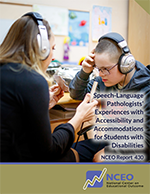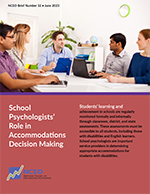Depending on a student’s disabilities and needs, it may be important to include a speech pathologist or a school psychologist in the decision-making process. NCEO has resources on the roles of speech pathologists and school psychologists in selecting accommodations, see the following reports: Speech-language pathologists’ experiences with accessibility and accommodations for students with disabilities (NCEO Report 430) and School psychologists’ role in accommodations decision making (NCEO Brief #32).
This report presents the findings of a study aimed at addressing the gap between policy and practice for speech-language pathologists (SLPs) who serve students identified with a speech-language impairment, including other co-existing disabilities. The following research questions were addressed: (1) What factors influence how SLPs make accessibility and accommodations decisions for students with disabilities, including English learners with disabilities? (2) How do SLPs participate in the IEP team classroom and assessment accessibility and accommodations decision-making process for students with disabilities, including English learners with disabilities? And (3) Do SLPs have professional development needs about accessibility and accommodations?
NCEO Brief: School Psychologists’ Role in Accommodations Decision Making (Brief #32)
Students’ learning and achievement in schools are regularly monitored formally and informally through classroom, district, and state assessments. School psychologists have a specialized understanding of data-based decision making, consultation, provision of academic assessment and intervention services, and the special education eligibility process. The accommodations decision-making process is one area where school psychologists can provide valuable knowledge and expertise to support students with disabilities in instruction and assessment. This Brief explains a five-part framework for educators and other specialists who serve students, including school psychologists, to use in the selection, administration, and evaluation of accommodations for the instruction and assessment of all students, including students with disabilities and English learners.


